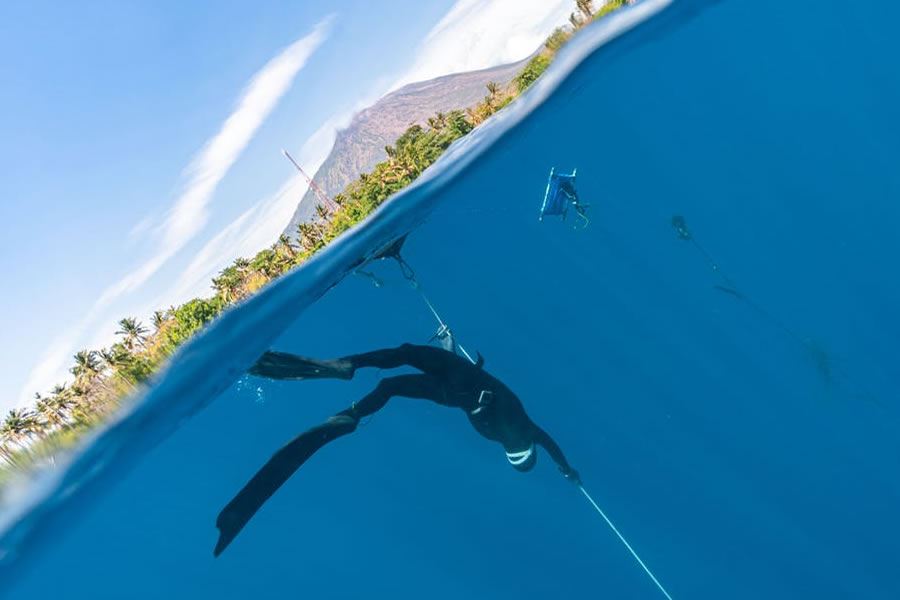🇺🇸 7 Things Every Freediver Beginner Should Know

(Sportalsub.net/ Thomas Nemel)
A Break Down of The Essential Know-How For Diving Enthusiasts
The ocean is a marvel of beauty, especially under the surface. It is one thing to see underwater footage on-screen, but experiencing the depths yourself can have a truly inspirational, lasting impact. An astounding 80% of the ocean remains unexplored to this day. The fact that you are reading this means that you have experienced some sort of pull to explore the blue depths yourself. Perhaps going diving is on your bucket list, or you are simply looking for a new exciting hobby. Either way, we can assure you that it is well worth the efforts involved.
There are quite a few ways to approach diving. Arguably the most authentic way is freediving. It means going underwater with the bare minimum of tools, your breath-holding ability being the most important factor. Besides some flaps, a wetsuit, and your single breath there is not much else to support you in this type of exploration. The upside is that you get to experience the ocean with no constraints. To be able to do this successfully requires some thoughtful preparation. The first step is getting your freediving essential know-how on point. Secondly, you will need to have pretty good stamina. In the case that you do intense cardio regularly and can consider yourself a full-fledged gym expert, you might not have to worry about physical preparation as much. For most people, however, becoming ready for freediving will involve a decent amount of training, especially pertaining to the expansion of one’s lung capacity. Now, let’s go over the 7 essential things you should know before you start freediving yourself.
The 7 Essential Things Every Freediver Should Know
1 – Always Have a Diving Buddy
In every freediving course this fact is stressed as being the most crucial – never dive alone. It is essential to always have someone with you when you are going into the water, be it shallow or deep. This means that you should ideally have someone of the same skill or more advanced by your side at all times. You have to be able to count on the person in case something goes wrong. It should also be remembered to regularly practice rescue scenarios, as well as first-aid procedures. Never take safety for granted and double-check if everything is working right at all times. All is fine until it is not. Getting into problems underwater can be dire, so never slack on the safety protocols.
2 – Be Careful when Equalizing
Equalization of the ears is an important part of the diving process, and it should become instinctive after a while. The pressure underwater and above it is vastly different, and your ears will be affected by it. Once the pressure increases as you dive deeper, it will manifest as a tension pushing on your ear. The process of equalization involves the re-balancing of pressure in the middle ear and the outer environment. It is done by either simply swallowing, or with the Valsalva Maneuver. The latter involves closing your nose, and then blowing air until your ears pop. It is safest to achieve equalization by swallowing. If that doesn’t work, do the Valsalva Maneuver. However, you must do it gently. Never force equalization, because you could damage your eardrums.
3 – Do Not Exhale Too Sharply
Never exhale too quickly, either when you are underwater, or coming up from the depths. This is where lung training comes into play. It is not only about increasing your lung capacity, but also about being strategic and thoughtful in how your ration your oxygen. You do not want to exhale air willy-nilly when you are diving. That is because you will lose your ability to dive for longer, you will reduce your buoyancy, and exhaling at depth could possibly result in lung barotrauma. A lungful of oxygen can add somewhere around 10 pounds of buoyancy. The less you have, the harder it will be for you to move around underwater. When you come up from the dive, it is just as important not to exhale too sharply because if you do it too suddenly, you could end up experiencing a samba or a blackout. Using the proper recovery breathing after you get to the surface should become an automatic reflex. Remember to include it in your training schedule.
4 – Keep Calm
The key to becoming a great freediver is learning how to relax on command. The tenser you are, the more oxygen your body will be using up. Calm and deep, slow breaths will work to lower your heart rate and thus help conserve oxygen. Any tense muscle in your body will use energy and air, so the more relaxed you can become, the better off you will be. Relaxation techniques are fundamental in all freediving courses. However, you could also start preparing yourself by doing yoga, pranayama, and other breathing exercises.
5 – Be Diligent with Adding Weights
Adding weights to your body will help you in the beginning stages of your freediving endeavors. The heavier you are, the faster the free fall will be. It is also true that you do not want to fall too fast because it can cause equalization issues. However, you should be diligent with considering how much weight is right for you because you will have to come up eventually. Having too much weight on you will make the come-up process more difficult. The way to calculate your ideal added weights is by aiming at the goal of reaching neutral buoyancy at 10 – 15 meters below the surface.
6 – Choose the Right Buoy
A buoy is an object that one fastens the safety rope to, and it serves as a constant point or orientation. Pick a buoy that is as bright and noticeable as possible. This is important so that you never lose track of it from down below, but also because it should be visible for nearby boats. In the case that you go freediving in a place where there is a lot of boat traffic, understand that it is an additional risk factor that needs to be mitigated. Always keep near to the buoy, never going further away than 2-3 meters from it. When you are going deeper than 20 meters below the surface, do not move further away from the rope than 2 meters. At those depths, the visibility is not great, and you never want to lose track of your safety rope. Another thing to remember is that there are strong currents at the deeper levels that can drag you away without you noticing. Always make sure to keep your safety rope in sight, and never overextend yourself.
7 – Keep Your Nutrition and Hydration in Check
Being ready for diving involves rationing your snacks beforehand. After a full meal, one should wait at least 3-4 hours before diving, and 1-2 hours after having a small snack. The body will require additional energy to digest your food, and that will be disadvantageous to your freediving ability. Other than that, digestion increases the blood flow to your stomach. It takes away the needed blood flow from your vital organs. The better your circulation is, the better you will be able to hold more oxygen in your lungs. Also, remember that long periods of freediving will dehydrate you quite a bit. Dehydration makes the equalization process more difficult on your body. Always make sure to drink plenty of water once you come up to the surface!
Conclusion
We hope that you learned something new about freediving from this article. All of this information should be taken seriously, and that is for your own good. While the key points seem quite strict, they are there to ensure that you can actually have fun and enjoy your diving trip as much as possible. Safety always goes first. Once you know you have the basics covered, then you can truly relax and take in the magnificence of the ocean without any worries. What are some things that you think people should know when freediving? We would love to hear your thoughts in the comment section below. Happy diving!
Authors Bio:

Thomas Nemel – thomasnemel@gmail.com
Is a writer, traveler, and avid freediver from Detroit, USA. He has been a diver for over ten years. Having explored a majority of diving hotspots in the world, he has accumulated a vast amount of knowledge about the sport. Nowadays, he enjoys sharing his insight through articles and blog-posts online.
Last Updated on February 24, 2021

